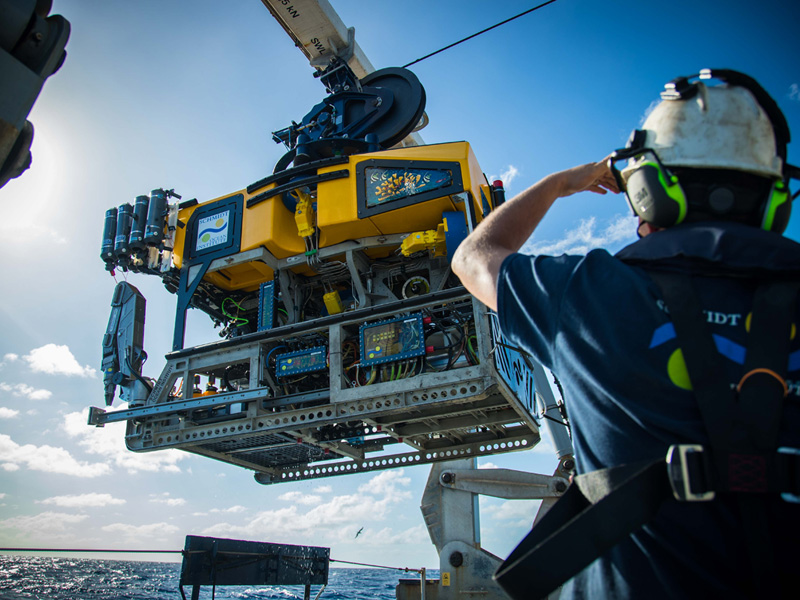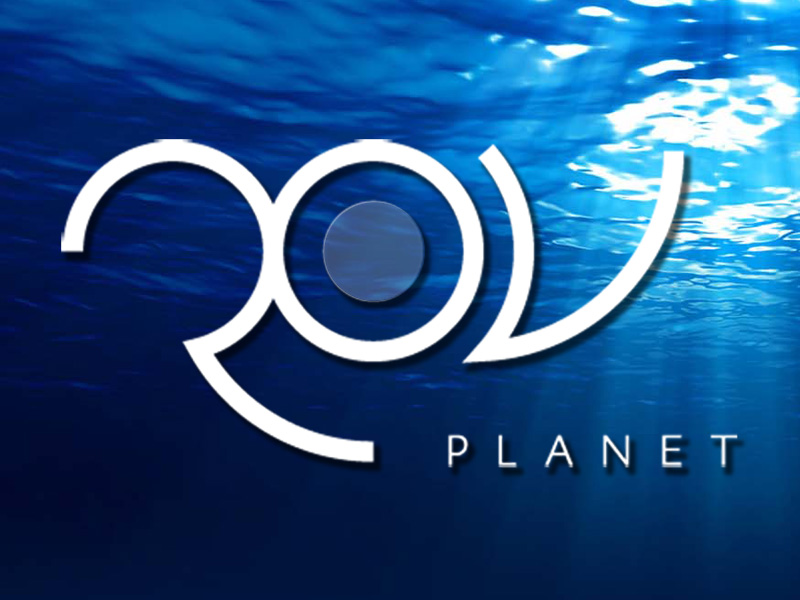
Ocean Robotics Planet Articles
Articles for Tag or Tags: Falkor
Number of matching Articles: 18
Scientists Discover Healthy Deep-Sea Coral Reefs and New Seamounts in the Galapagos
30.10.2023
Scientists examining underwater cliff ecosystems onboard research vessel Falkor (too) using the 4,500 meter robot, ROV SuBastian, have discovered two pristine coral reefs in the waters surrounding the Galápagos Islands.
These newly identified cold-water reefs are situated at depths ranging from 370 to 420 meters. The discovery expands our understanding of deep reefs within the Galápagos Islands Marine Reserve.
Scientists Discover New Deep-sea Octopus Nursery in Costa Rica
05.07.2023
A team of international scientists have discovered a new deep-sea octopus nursery at a low-temperature hydrothermal vent offshore of Costa Rica. The discovery of the brooding site brings the world’s known octopus nurseries to three. The team also proved that the first known aggregation of deep-sea octopus, the Dorado Outcrop, is an active nursery.
Schmidt Ocean Institute Launches New Research Vessel That Will Change The Face Of Ocean Exploration
03.03.2023
Schmidt Ocean Institute launched today its newly refitted 110-meter global-class research vessel for use by scientists worldwide to dramatically advance marine science and push the frontiers of deep sea expedition.
Schmidt Ocean Institute Donates Research Vessel to the National Research Council (CNR)
14.03.2022
Founders Eric and Wendy Schmidt donate research vessel Falkor to Italy’s science agency to conduct ocean science in the Mediterranean and beyond. Schmidt Ocean Institute announced today the donation of its 82.9-meter research vessel, Falkor, to the Italian Consiglio Nazionale delle Ricerche (CNR), expanding the science agency’s fleet of research vessels and continuing Falkor’s legacy of conducting ocean science. The ship will be renamed to Gaia Blu.
Scientists Discover New Hydrothermal Vents and Possible New Species in the Gulf of California
22.11.2021
A multidisciplinary team of scientists from Mexico and the U.S. discovered new hydrothermal vents and six possible new animal species during a 33-day expedition off the coast of La Paz on Schmidt Ocean Institute's research vessel Falkor. The underwater robot ROV SuBastian was used to explore and sample vents emitting fluids at temperatures up to 287°C (549°F) along with the unique animal communities inhabiting this extreme environment. ROV SuBastian additionally captured
stunning imagery of the seafloor including hydrothermal mirror pools, calcite spires, and iridescent blue scale worms.
Scientists Explore Seamounts in Phoenix Islands Archipelago, Gaining New Insights into Deep Water Diversity and Ecology
09.07.2021
Marine scientists aboard Schmidt Ocean Institute’s research vessel Falkor have identified likely new marine species and deep sea organisms on nine seamounts that were explored for the first time in the remote Phoenix Islands Archipelago. In a 34-day expedition that ended today, scientists also conducted high-resolution seafloor mapping of more than 30,000 square kilometers and video exploration of five additional seamounts.
First Comprehensive Study of NW Australia`s Deep Corals Completed
02.05.2021
Scientists circumnavigate and map the seafloor of the entire mesophotic (deep water) zone in Ashmore Reef Marine Park.
Scientists discovered a sea snake thought to be locally extinct and saw
several species such as the great spotted cowrie (Perissersoa guttata) for the first time in the Ashmore Reef Marine Park, off Australia, during Schmidt Ocean Institute's 18-day expedition that concluded this week.
Schmidt Ocean Institute Acquires New Research Vessel to Expand Ability to Explore and Research the Ocean
24.03.2021
Schmidt Ocean Institute announced today it has acquired a new
research vessel that will expand the organization’s philanthropic science program and capability
to explore the Ocean.
New Partnership Between Schmidt Ocean Institute and Intergovernmental Oceanographic Commission of UNESCO to Support Ocean Decade
11.12.2020
The Intergovernmental Oceanographic Commission of UNESCO (IOC-UNESCO), the United Nations body responsible for championing global ocean science and services, announced today a new partnership to work together with philanthropic non-profit, Schmidt Ocean Institute to advance the United Nations Decade of Ocean Science for Sustainable Development.
Australian Scientists Discover New Corals on most Comprehensive Deep Sea Study of Great Barrier Reef and Coral Sea Marine Parks
09.09.2020
For the first time, scientists have viewed the deepest regions of the Great Barrier Reef Marine Park, discovered five undescribed species consisting of black corals and sponges, and recorded Australia’s first observation of an extremely rare fish.
First Completely Remote At-Sea Science Expedition in Australia`s Coral Sea Marine Park Discovers New Corals and Possible Speices Never Before seen
25.06.2020
Scientists working remotely with Schmidt Ocean Institute, one of the only at-sea science expeditions to continue operating during the global pandemic, have completed a first look at deep waters in the Coral Sea never before seen. The Australian science team discovered the deepest living hard corals in Eastern Australian waters, sighted fish in regions where they had never been found before, and identified up to 10 new marine species of fish, snails, and sponges.
New Species Discovered during Exploration of Abyssal Deep Sea Canyons off Ningaloo
14.04.2020
Unique fauna of the Cape Range and Cloates Canyons off of Ningaloo have been documented
at unexplored depths by researchers from the Western Australian Museum aboard Schmidt
Ocean Institute’s R/V Falkor. Seemingly the longest animal ever recorded, glass sponges, and
octopus squid are among species seen for the first time in Western Australia.
Schmidt Ocean Institute Offers Online Educational Science Content for Students
02.04.2020
New #SchoolsOutScience identifies homeschooling resources; online content ranges from
robotics and engineering games, interactive science lesson plans and livestream of neverbefore-seen footage of the deep ocean.
As millions of school age children transition their education to home classrooms in the wake of the devastating COVID-19 global pandemic, Schmidt Ocean Institute has assembled a wealth of free online science resources for parents and teachers.
New Deep Sea Animal Discoveries Warrant Expanded Protections in Costa Rican Waters
09.02.2019
Scientists aboard Schmidt Ocean Institute’s research vessel Falkor surveyed deep-sea seamounts outside Isla del Coco UNESCO World Heritage site revealing coral communities with surprising diversity.
Unexplored Ocean Depths Bustling with Life, Despite Extreme Conditions
21.12.2016
Schmidt Ocean Institute’s new underwater vehicle SuBastian completes its first expedition discovering new hydrothermal vent sites and possible new species in the Mariana Back-Arc, an extreme deep-ocean environment.
APRA HARBOR, GUAM – A team of leading geologists, chemists, and biologists aboard research vessel Falkor have just finished surveying the largely unexplored Mariana Back-Arc for life at depths greater than 13,000 feet.
Dr. David Butterfield, JISAO, University of Washington, and Dr. William Chadwick, NOAA-PMEL and Oregon State University, led the group to the Back-Arc; returning for the second phase of a two-part exploration of the region.
In 2015, the team of scientists located new hydrothermal vents in the Back-Arc region, including evidence of recent lava flows. This year, the team returned to these vent systems with the new remotely operated vehicle (ROV), SuBastian, to characterize their water chemistry and biodiversity. The new results fill a gap in knowledge about the biogeography of these unique deep-sea ecosystems and has implications for how tectonic setting influences the composition of chemosynthetic animal communities worldwide.
First take off of unmanned aircraft scheduled from research vessel Falkor
13.10.2016
Research vessel Falkor leaves Darwin today to explore the poorly understood air-sea
interactions across the Indian and Pacific Ocean. This research is very important in understanding the ocean’s role in global climate change. The exchange of energy and matter between the atmosphere and the ocean are particularly onerous requirements, and have largely been neglected in climate research. Chief Scientist Dr. Oliver Wurl, from the University of Oldenburg and his international team of scientists from Germany, the United States, and United Kingdom plan to gain new insight during this 31-day expedition.
Scientists Explore Earth’s Newest Land Using Advanced, High-Resolution 3D Mapping
04.05.2016
SUVA, FIJI – Research vessel (R/V) Falkor will return to port today after 28 days at sea conducting pioneering studies including mapping the Earth’s newest island landscape in the Kingdom of Tonga (Southwestern Pacific).
NASA has partnered with Schmidt Ocean Institute and Columbia University to produce a high resolution submarine topographic map of the undersea portion of a volcano that first appeared in January 2015 as a result of a “surtseyan” style eruption involving the dynamic interaction of hot volcanic materials and sea water.
Virtual Reality Technology Reveals Underwater Vents in New Ways
04.04.2016
Scientists aboard Schmidt Ocean Institute’s research vessel Falkor have developed the first 3D model of an entire
hydrothermal vent field for Virtual Reality, covering the largest area of seafloor ever imaged that way.






















